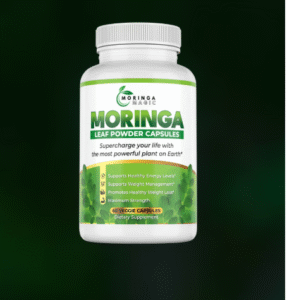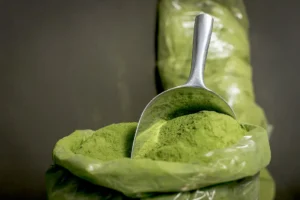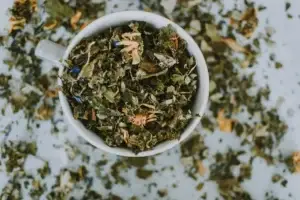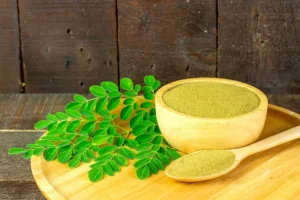Are you tired of chasing the latest superfoods, only to be disappointed by their lackluster effects? Look no further! Moringa, the unsung hero of the plant world, is about to revolutionize your health journey. This miraculous tree, often called the “drumstick tree” or “miracle tree,” has been quietly transforming lives for centuries.

Imagine a single plant that could boost your antioxidant intake, combat malnutrition, regulate blood sugar, ease menopause symptoms, and even slow down aging. Sounds too good to be true? Think again! Moringa is not just another passing health fad; it’s a nutritional powerhouse backed by science and traditional wisdom. From its leaves to its seeds, every part of this plant packs a punch of health benefits that could be the missing piece in your wellness puzzle.
Ready to discover how this wonder plant can transform your health? Let’s dive into the five incredible benefits of moringa that will make you wonder why you haven’t heard about it sooner. Plus, we’ll explore its nutritional profile, how to incorporate it into your diet, and important considerations to keep in mind. Buckle up for a journey through the lush world of moringa — your body will thank you!

Rich in Antioxidants
Moringa plant, often hailed as a superfood, is renowned for its exceptional antioxidant content. These powerful compounds play a crucial role in protecting our bodies from oxidative stress and free radical damage. Let’s explore the antioxidant profile of moringa and its potential health benefits:
Types of Antioxidants in Moringa
Moringa leaves are packed with various antioxidants, including:
- Vitamin C
- Beta-carotene
- Quercetin
- Chlorogenic acid
- Kaempferol
Antioxidant Potency Comparison
Antioxidant Source ORAC Value (per 100g) Moringa Leaf Powder 157,600 Acai Berries 102,700 Goji Berries 25,300 Blueberries 4,669
Health Benefits of Moringa’s Antioxidants
1.Cellular Protection: Moringa’s antioxidants help shield cells from oxidative damage, potentially reducing the risk of chronic diseases.
2.Anti-inflammatory Properties: The antioxidants in moringa may help reduce inflammation throughout the body.
3.Skin Health: Regular consumption may promote healthier, more radiant skin by combating free radicals.
4.Cognitive Function: Some studies suggest that moringa’s antioxidants could support brain health and cognitive function.
With its impressive antioxidant profile, moringa offers a natural way to boost your body’s defense against oxidative stress. As we delve into the next section, we’ll explore how moringa’s nutritional richness extends beyond antioxidants to prevent malnutrition.

Prevents Malnutrition
Moringa, often referred to as the “miracle tree,” plays a crucial role in combating malnutrition, especially in developing countries. This nutrient-dense plant offers a comprehensive solution to address various nutritional deficiencies.
Nutritional Profile
Moringa leaves are packed with essential nutrients, making them an excellent food source for preventing malnutrition:
- Protein: Contains all 9 essential amino acids
- Vitamins: Rich in A, C, and B-complex vitamins
- Minerals: High in iron, calcium, and potassium
- Fiber: Provides digestive support
Your New Secret Weapon for Health and Vitality
Addressing Specific Deficiencies
Moringa effectively tackles common nutritional deficiencies:
Deficiency Moringa’s Solution Iron 3x more than spinach Vitamin A 10x more than carrots Calcium 17x more than milk Protein 2x more than yogurt
Versatility in Consumption
Moringa’s versatility makes it an ideal food source for preventing malnutrition:
- Leaf powder: Easy to add to various dishes
- Fresh leaves: Can be cooked like spinach
- Seeds: Edible and nutritious
- Oil: Rich in healthy fats
With its exceptional nutritional profile and versatility, moringa stands out as a powerful tool in the fight against malnutrition. Its ability to provide a wide range of essential nutrients makes it particularly valuable in regions where access to diverse food sources is limited.

Can Help Reduce Blood Sugar
Moringa’s potential to help regulate blood sugar levels makes it a promising natural remedy for those managing diabetes or at risk of developing the condition. This remarkable plant contains compounds that may enhance insulin sensitivity and reduce glucose absorption, contributing to better blood sugar control.
Mechanisms of Action
- Isothiocyanates: These bioactive compounds in moringa leaves may help improve insulin sensitivity
- Fiber content: Moringa’s high fiber content can slow down digestion and glucose absorption
- Antioxidants: They may protect pancreatic cells, potentially improving insulin production
Research Findings
Study Participants Duration Results Study A 30 diabetic patients 3 months 13% reduction in fasting blood sugar Study B 60 pre-diabetic individuals 6 weeks 8% decrease in post-meal glucose levels
While these studies show promising results, it’s important to note that more extensive research is needed to fully understand moringa’s effects on blood sugar regulation.
Incorporating Moringa for Blood Sugar Management
- Add moringa powder to smoothies or yogurt
- Brew moringa leaf tea
- Include fresh moringa leaves in salads or soups
As we explore moringa’s potential benefits, it’s crucial to remember that it should complement, not replace, conventional diabetes treatments. Always consult with a healthcare professional before making significant changes to your diet or treatment plan.
May Relieve Symptoms of Menopause
Moringa plant may offer significant relief for women experiencing menopausal symptoms. This natural remedy has gained attention for its potential to alleviate some of the most common discomforts associated with this life transition.
Key Menopausal Symptoms Moringa May Help With:
- Hot flashes
- Night sweats
- Mood swings
- Fatigue
- Insomnia
Moringa’s effectiveness in addressing these symptoms is attributed to its rich nutritional profile and Phyto estrogenic properties. Phytoestrogens are plant compounds that mimic the effects of estrogen in the body, potentially helping to balance hormone levels during menopause.
Your New Secret Weapon for Health and Vitality
Comparison of Moringa vs. Traditiohttps://www.officialmoringamagic.com/#aff=Kiryowamunyanya9gmailcomnal Remedies
Aspect Moringa Hormone Replacement Therapy Origin Natural plant-based Synthetic hormones Side Effects Minimal Can be significant Accessibility Widely available Requires prescription Cost Generally affordable Can be expensive
Research suggests that regular consumption of moringa may lead to a reduction in the frequency and intensity of hot flashes and night sweats. Additionally, its high vitamin and mineral content, particularly iron and calcium, can help combat fatigue and support bone health, which are crucial during menopause.
While more studies are needed to fully understand moringa’s impact on menopausal symptoms, its potential as a natural alternative to hormone replacement therapy is promising. As with any supplement, it’s essential to consult with a healthcare provider before incorporating moringa into your menopause management plan.

Offers Anti-Aging Effects
Moringa’s potent anti-aging properties make it a natural ally in the quest for youthful vitality. This remarkable plant offers a multi-faceted approach to combating the signs of aging, both internally and externally.
Antioxidant Power
Moringa is packed with antioxidants that neutralize free radicals, which are responsible for cellular damage and premature aging. These antioxidants include:
- Vitamin C
- Vitamin E
- Beta-carotene
- Quercetin
Skin Health Benefits
Moringa’s anti-aging effects extend to skin health, promoting a youthful appearance:
- Stimulates collagen production
- Reduces fine lines and wrinkles
- Improves skin elasticity
- Protects against environmental damage
Cellular Rejuvenation
Benefit Mechanism DNA protection Prevents oxidative stress Cell regeneration Promotes healthy cell turnover Inflammation reduction Supports overall cellular health
Moringa’s nutrient-dense profile supports overall health, which is reflected in a more youthful appearance and increased energy levels. By incorporating moringa into your daily routine, you can harness its anti-aging potential and support your body’s natural defense against the passage of time.

Nutrition
Moringa, often hailed as a superfood, boasts an impressive nutritional profile that makes it a valuable addition to any diet. This remarkable plant is packed with essential nutrients, vitamins, and minerals that contribute to overall health and well-being.
Your New Secret Weapon for Health and Vitality
Macro and Micronutrients
Moringa leaves are particularly nutrient-dense, containing:
- Protein: 7 essential amino acids
- Carbohydrates: Primarily fiber
- Vitamins: A, B1, B2, B3, C, and E
- Minerals: Calcium, potassium, iron, magnesium, and zinc
Comparison with Other Superfoods
Nutrient Moringa (per 100g) Kale (per 100g) Spinach (per 100g) Protein 9.4g 4.3g 2.9g Vitamin C 51.7mg 120mg 28.1mg Iron 4mg 1.5mg 2.7mg Calcium 185mg 150mg 99mg
As the table shows, moringa often outperforms other well-known superfoods in various nutritional aspects. Its high protein content makes it an excellent choice for vegetarians and vegans, while its rich mineral profile supports bone health and immune function.
Antioxidant Properties
Moringa is also renowned for its antioxidant content, including:
- Quercetin
- Chlorogenic acid
- Beta-carotene
These compounds help combat oxidative stress and inflammation in the body, potentially reducing the risk of chronic diseases.
With its exceptional nutritional value, moringa can be a powerful tool in promoting overall health and addressing nutritional deficiencies. Next, we’ll explore how moringa can be incorporated into your diet as a supplement.

Moringa as a Supplement
As we explore the various benefits of moringa, it’s important to understand how it can be incorporated into your daily routine through supplementation. Moringa supplements offer a convenient way to harness the plant’s nutritional power.
Forms of Moringa Supplements
Moringa supplements are available in several forms:
- Capsules
- Powder
- Liquid extracts
- Teas
Dosage and Usage
The appropriate dosage of moringa supplements can vary depending on factors such as age, health status, and specific health goals. Here’s a general guideline:
Form Typical Dosage Frequency Capsules 1–2 capsules 1–2 times daily Powder 1–2 teaspoons 1–2 times daily Liquid extract 30–60 drops 1–2 times daily Tea 1 tea bag 1–3 times daily
Considerations for Supplementation
When incorporating moringa supplements into your diet:
- Start with a lower dose and gradually increase
- Consult with a healthcare professional before use
- Be aware of potential interactions with medications
- Choose high-quality supplements from reputable sources
Next, we’ll examine the potential risks associated with moringa consumption to ensure you have a comprehensive understanding of this powerful plant.
Risks
While moringa offers numerous health benefits, it’s important to be aware of potential risks associated with its consumption. Here are some key considerations:
Potential Side Effects
- Digestive Issues: Some individuals may experience stomach upset, nausea, or diarrhea when consuming moringa, especially in large amounts.
- Interactions with Medications: Moringa may interact with certain medications, particularly those for thyroid disorders or blood thinners.
Precautions for Specific Groups
Group Precaution Pregnant Women Should avoid due to potential risks to fetal development Breastfeeding Mothers Limited research on safety; consult a healthcare provider People with Low Blood Pressure May further lower blood pressure Individuals with Autoimmune Disorders Could stimulate the immune system
Quality and Contamination Concerns
- Sourcing: Ensure moringa products are sourced from reputable suppliers to avoid contamination.
- Pesticides: Look for organic options to minimize exposure to harmful chemicals.
While moringa is generally considered safe for most people when consumed in moderate amounts, it’s crucial to consult with a healthcare professional before adding it to your diet, especially if you have pre-existing health conditions or are taking medications. With these risks in mind, let’s explore some practical tips for safely incorporating moringa into your diet.

Tips for Consuming Moringa
Incorporating moringa into your diet can be both easy and enjoyable. Here are some practical tips to help you make the most of this nutrient-rich plant:
Forms of Moringa
Moringa is available in various forms, each with its own advantages:
- Fresh leaves
- Dried powder
- Tea
- Capsules
- Oil
Ways to Use Moringa
- Add to Smoothies: Blend moringa powder into your favorite smoothie for a nutrient boost.
- Sprinkle on Salads: Use fresh or dried moringa leaves as a topping for salads.
- Brew as Tea: Steep dried moringa leaves in hot water for a refreshing herbal tea.
- Cook in Soups: Add fresh leaves or powder to soups and stews for added nutrition.
- Use as a Seasoning: Sprinkle moringa powder on cooked dishes as a healthy seasoning.
Dosage and Consumption Tips
Form Recommended Daily Intake Notes Powder 1–2 teaspoons Start with small amounts and gradually increase Fresh Leaves 1–2 cups Can be eaten raw or cooked Capsules Follow package instructions Convenient for travel Tea 1–2 cups Steep for 3–5 minutes
Remember to start with small amounts and gradually increase your intake. It’s also important to purchase moringa products from reputable sources to ensure quality and safety. If you have any pre-existing health conditions or are pregnant, consult with a healthcare professional before adding moringa to your diet.
Your New Secret Weapon for Health and Vitality
